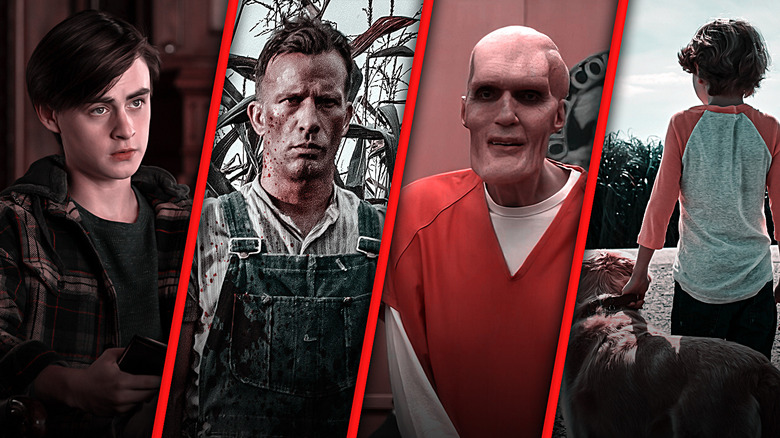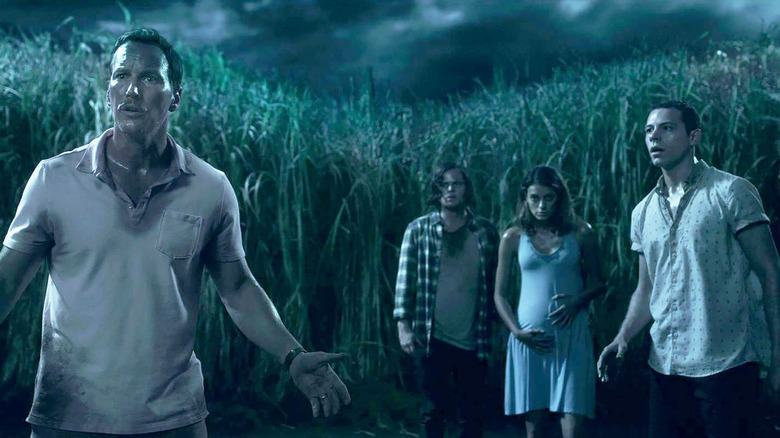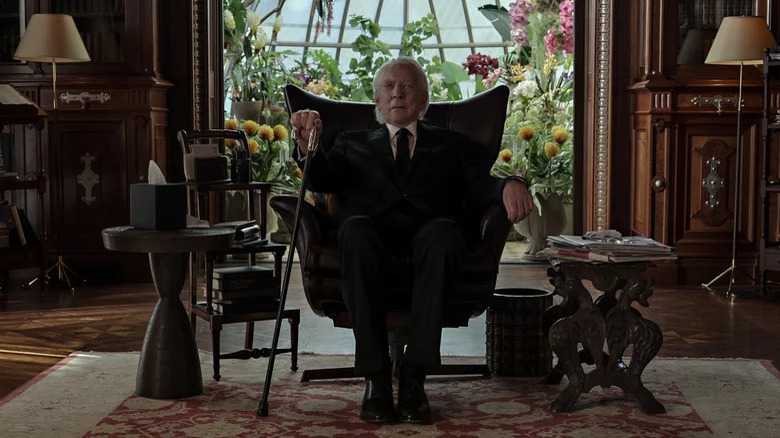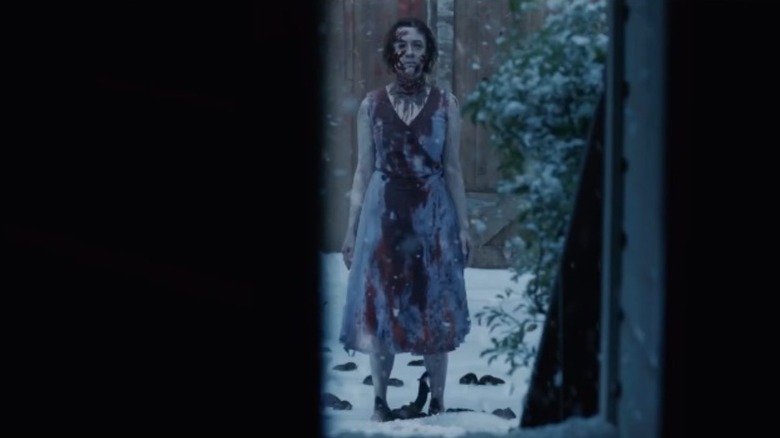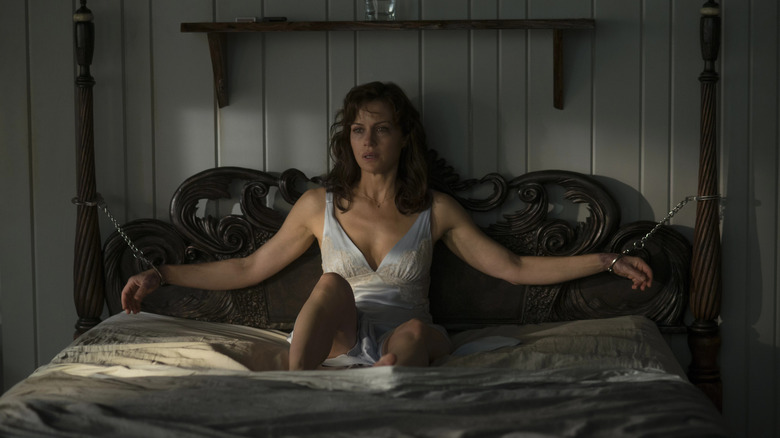Every Stephen King Netflix Movie, Ranked
Stephen King movies have been with us almost as long as Stephen King books — King's first novel "Carrie" became a film two years after it hit bookshelves. And while the adaptations have been coming steadily since the '70s, King movies and TV shows experienced something of a boom in the 2010s. This was primarily due to 2017's film adaptation of "It," which became a horor blockbuster, hauling in $701.8 million at the box office. Suddenly, everyone wanted to be in the Stephen King business again, and the aftermath of "It" saw a wealth of adaptations get the green light. This trend hasn't died out, either — new King adaptations continue to come our way. A long-delayed take on "Salem's Lot" is due out on Max later this year, and film adaptations of the King short stories "The Life of Chuck" and "The Monkey" are both on the horizon.
Netflix also wanted in on this Stephen King action, and the streaming service has so far brought four King films to the small screen. So how do they stack up? As you might imagine, some are better than others, but as a fan of King's work, I can honestly say that all four of them are worth watching for various reasons, although I'll admit that one of them is more of a miss than a hit. With all that in mind, I've gone ahead and ranked the four Stephen King Netflix movies from worst to best. As should be obvious, all of these movies are currently streaming on Netflix, so feel free to have yourself a mini Stephen King marathon after (or before!) you read this ranking.
4. In the Tall Grass
I'm sorry to say the worst film of the bunch is "In the Tall Grass," which hit Netflix in 2019. What bums me out about this is that the source material, a short story King co-wrote with his son Joe Hill, is friggin' great. It's disturbing, and strange, and features a shocking, gruesome ending that left me rattled. When it was announced the story was being turned into a movie by Vincenzo Natali, the director of "Cube" and "Splice," I got excited. Sadly, Natali's film ultimately chickens out — it feels like the movie is afraid to stick to the bleak nature of the story. That's not to say "In the Tall Grass" isn't without its merits. The best reason to watch this one is to see Patrick Wilson ham it up big time, playing a man slowly growing more and more unhinged. Wilson is a lot of fun here, I just wish the rest of the film matched his gonzo energy.
In "In the Tall Grass," Becky (Laysla De Oliveira), who is pregnant, is on a road trip with her brother Cal (Avery Whitted). The siblings stop in a parking lot near an old, abandoned church, flanked by a vast field of tall grass. Suddenly, they hear voices calling for help from within all that damn grass. Being good people, they decide to venture into the overgrowth to help. This turns out to be a huge mistake, because once inside the grass, the siblings find themselves trapped. Space and time don't seem to obey normal laws in all that tall grass, and our characters find themselves becoming increasingly panicked and desperate. It's a great premise, but the film ultimately fizzles.
3. Mr. Harrigan's Phone
While not a great Stephen King movie, John Lee Hancock's "Mr. Harrigan's Phone" has its spooky charms, aided by its source material — a short story King wrote about an unquiet ghost helping a teenage boy. The late, great Donald Sutherland is Mr. Harrigan, a grumpy, wealthy old man who befriends Craig (Jaeden Martell, who also appeared in the "It" movies), a local kid from a working-class family. Harrigan is losing his eyesight as he ages, so he hires Craig to read to him. Sounds pleasant, right? The story is set at the dawn of the iPhone, and while Mr. Harrigan is instantly stand-offish about the new-fangled gadget, he eventually grows addicted when he gets a phone of his own. After Harrigan dies, Craig slips the dead man's iPhone into the suit jacket pocket of the corpse as he lays in his coffin. But wait — this scary story is just getting started! Feeling sad about the death of his elderly friend, Craig sends the now-buried Mr. Harrigan a text. And wouldn't ya know it? Mr. Harrigan replies! Creepy!
Soon, Craig is summoning the specter of Mr. Harrigan to help him deal with some of life's problems, but it quickly becomes clear that Craig might've gone too far. Like the story that inspired it, "Mr. Harrigan's Phone" never comes right out and shows us the ghost of Mr. Harrigan floating around doing scary stuff. As a result, the movie is kind of low on scares, and more of an eerie little character drama. It has an almost pleasant YA-horror vibe to it, and there's nothing wrong with that. This ultimately feels less like Stephen King and more like a feature-length episode of "Goosebumps."
2. 1922
"1922" is a nasty piece of work. Based on King's novella of the same name, "1922" is a depression-era tale of greed, murder, ghosts, and rats. Lots and lots of rats. Thomas Jane (who also appeared in the Stephen King movie "The Mist") is Wilfred James, a farmer living in Nebraska in the 1920s. When Wilfred's alcoholic wife Arlette (Molly Parker) suddenly decides on selling off the farm and moving away, the amoral Wilfred convinces his teenage son Henry (Dylan Schmid) to help him kill her. Father and son bump off Ma and dump her body in a well, but that act of violence only begets more disaster as things spiral out of control for Wilfred and Henry. This is ultimately a morality tale; the story of how a kind of cosmic justice will eventually catch up with those who do evil deeds, and how those deeds themselves can poison everything.
While there's some supernatural stuff here and there, and plenty of gross-out moments involving rats, "1922" isn't your typical Stephen King horror story. King, for his part, was pleased with the adaptation. He even compared it to "There Will Be Blood," saying, "It has the same kind of flat, dead-eyed, effect to it, so it made for a really good suspense picture, and it's a movie that won't leave my mind. It has this sort of poisonous effect, it just sort of sticks there because some of the images are so good." I don't think I'd go so far as to say "1922" is as good as "There Will Be Blood," but it's still plenty effective.
1. Gerald's Game
For years, Stephen King's "Gerald's Game" was considered to be unadaptable. The book is set almost entirely in one room, with most of the action happening within the mind of the protagonist. It didn't seem very cinematic. And then Mike Flanagan came along and showed everyone how to do it. His solution: pretty much sticking to the source material. Yep, that was apparently all it took. Who knew?
In "Gerald's Game," married couple Jessie (Carla Gugino) and Gerald (Bruce Greenwood) head to a remote lake house for a little getaway. The pair have begun to engage in some light S&M to spice up their sex life, and Gerald handcuffs Jessie to the bed. However, after being fettered, Jessie decides she doesn't want to play anymore. She asks Gerald to uncuff her, but he doesn't, and makes it clear he's going to ignore her protests and assault her. Jessie angrily kicks her husband in the balls as he advances on her — which triggers a fatal heart attack in Gerald. Now Jessie is trapped, cuffed to the bed with the body of dead husband nearby. There are no neighbors around to hear her call for help. Oh, but there is a very hungry dog lurking by. And also a serial killer.
Flanagan cuts back and forth in time, showing us Jessie's traumatic past as she grows more and more disoriented while chained to that damn bed in the present. There's nothing supernatural here, but there are plenty of real-life horrors, and there's a gruesome, graphic, bloody scene near the end of the movie that's guaranteed to make you gag. Flanagan is a filmmaker who just gets King, and he does a great job adapting the psychological drama of the book to the screen, aided by a stellar lead performance from Carla Gugino. As for King, he had nothing but praise for the film, calling it "Horrifying, hypnotic, terrific."
